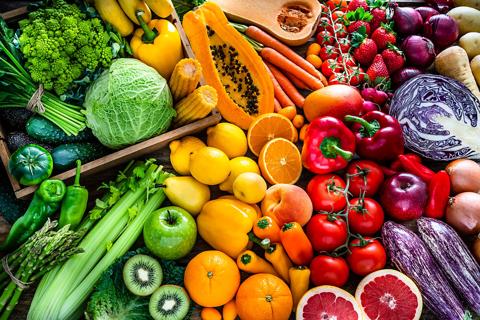Fad diets are typically based on incomplete or faulty research and should be avoided

If eating healthy was really as easy as having an apple a day. Or only eating soup. Or eating certain foods based on your blood type … your doctor (and the entire medical establishment) would have told you that by now.
Cleveland Clinic is a non-profit academic medical center. Advertising on our site helps support our mission. We do not endorse non-Cleveland Clinic products or services. Policy
In reality, no one is hiding some magical weight-loss secret. The truth is that the key to healthy eating is the same advice you hear all the time. Eat a variety of whole, natural foods. Take in plenty of plant-based products. Keep your intake of packaged and processed foods to a minimum.
So, those fad diets that celebrities and social media influencers rave about? The ones that promise to “rid belly fat fast” or “lose 10 pounds in a week”? Not going to cut it.
So why, then, have fad diets become so pervasive in our culture? And how do you know if the diet advice you’re getting is something to take seriously? We asked registered dietitian Maxine Smith, RD, LD, about how to spot a fad diet and advice for evidence-based healthy eating.
Fad diets are eating plans that are often promoted as the “best” or “fastest” approach to losing weight. They can sound like a newly discovered “hack” that promises a better, healthier you.
Fad diets often involve eliminating certain foods, banning entire food groups or overselling the benefits of a particular food. For example, some fad diets:
The thing is, fad diets are often based on limited or faulty research — that is, when they’re based on research at all.
“Oftentimes, fad diets will be based on some bit of information learned in research but will exploit it to such an extreme that it’s no longer scientifically sound,” Smith explains.
For example, sure, fruit is healthy for you. No one will argue that. But does that mean it’s healthy to go full-on fruitarian and fill up entirely on strawberries and citrus? No.
Some health conditions do call for certain foods to be limited or eliminated from your diet. That’s a pretty standard, science-backed approach to manage conditions like heart disease, kidney disease, diabetes or celiac disease. Those diets should be managed closely by a healthcare provider like a physician or a dietitian to ensure you’re getting proper nutrition and managing your condition.
But fad diets aren’t typically sold as a healthy lifestyle change for people who are experiencing chronic disease. They’re more often hyped as a DIY, quick-and-easy weight-loss secret. What they don’t tell you, though, is that they can leave you at risk of missing out on essential nutrition and that their effects likely won’t last.
Fad diets typically don’t take into account the full range of vitamins and minerals your body actually needs.
“The trouble with fad diets is that they often promote eliminating foods that contain necessary nutrients to maintain good health,” Smith says.
Fad diets may lack major nutrients, such as dietary fiber or carbohydrates, as well as certain vitamins, minerals and protective phytochemicals. Cutting nutrients can leave you at risk of developing serious health issues.
On the flip side, fad diets may overemphasize specific foods, which can also be problematic. When fad diets suggest that foods like grapefruit or acai berries are the new “it” food, they often encourage eating them in amounts well above what’s recommended by major health organizations like the American Heart Association or the Academy of Nutrition and Dietetics.
All fad diets have one thing in common: They propose a temporary solution to what for many people is a lifelong challenge. Namely, weight loss.
Once the diet is stopped, any benefit is usually lost.
“Fad diets that emphasize weight loss may help you shed a few pounds for a little while. But the lost weight is usually regained quickly,” Smith notes. “That’s because fad diets don’t focus on lifestyle modification, which is necessary to keep weight off, and these diets aren’t sustainable throughout life.”
Smith explains that highly restrictive diets are extremely difficult to keep up. Cutting out entire food can leave you feeling deprived and lead to cravings. And most fad diets don’t allow for much in the way of flexibility. So, you “cheat” on your diet. You eventually give it up because it’s just too much to manage.
And as most fad diets don’t also incorporate other healthy-living modifications, like exercise, improved sleep habits or stress reduction, once you stop adhering to the diet, your weight returns to where it started.
But how do you know if the advice you’re getting is a fad diet or healthy advice that you should listen to? Smith says to look for these clues that scream “fad diet”:
Rather than jumping into the latest trend in dieting, Smith suggests sticking with tried-and-true (and evidence-based) weight loss and healthy living advice. Namely:
Many healthcare professionals consider the Mediterranean diet the gold standard for healthy eating. It emphasizes whole, natural foods, healthy fats and lean proteins.
If you’re unsure whether the diet and eating advice you’re getting is healthy, talk with a healthcare provider, like a primary care doctor or a registered dietitian. They can help you follow an approach to healthy eating that meets your goals.
Learn more about our editorial process.

Eating more natural, whole foods can lower your risk of heart and cardiovascular diseases

These trendy fungi may promote a healthy brain, heart and gut, but more research is needed to say for sure

A well-balanced diet with anti-inflammatory foods can help reduce flare-ups and severity of psoriasis symptoms

This vital nutrient helps your brain and body in many ways — and most of us need more of it

This powerful carotenoid can help with your eye and skin health, LDL reduction and cognitive function

Wrapped or sandwiched, try to choose fillings and condiments that are minimally processed, low in saturated fat and high in fiber

Beyond the usual offenders like garlic and onions, foods like red meat, fish and spices can cause a stink effect as well

Found in colorful foods like spinach, corn and oranges, this carotenoid helps with eye, skin and liver health

Your metabolism may torch 1,300 to 2,000 calories daily with no activity

A gentle touch in all the right places may help drain your sinuses